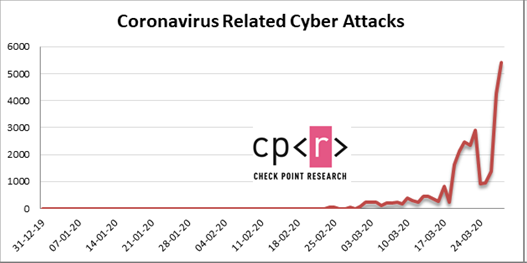On average, over 2,600 coronavirus-related cyber attacks occur each day.
Researchers at Check Point continue to see a dramatic rise in the number of coronavirus-related cyber attacks. In the past 2 weeks alone, the number of coronavirus-related cyber attacks have increased significantly from a few hundred to as high as over 5,000 on March 28. On average, over 2,600 coronavirus-related cyber attacks occur each day. Although the number of coronavirus-related cyber attacks has seen a sharp rise, the overall number of cyber threat activities in organizational networks worldwide has dropped monthly by 17% between January and March 2020.
Check Point leveraged its threat intelligence engine, Threat Cloud, to surface these numbers. Further examination has led to some additional insight:
- 84% of the events were triggered by phishing websites
- 2% of the events involved the victim accessing the malicious website using his/her mobile device
Check Point defines coronavirus-related attacks as those that involve:
- Websites with “corona”/”covid” in its domain
- Files with “Corona” related file names
- Files that have been distributed with coronavirus-related subjects in their email
In the past two weeks, more than 30,103 new coronavirus-related domains were registered, of which 131 are malicious and 2,777 are suspicious and under investigation. This means that, in total, over 51,000 coronavirus-related domains have been registered since January 2020, the relative start of the coronavirus pandemic.
“The significant incline in coronavirus-related cyber attacks is in correlation with the devastating news about the situation in US and EU. As the number of physical casualties increase, so is the number of cyber attacks relating to the virus. We can expect this trend to continue in the near-term,” says Omer Dembinsky, Data Manager of Threat Intelligence at Check Point. “Clearly, hackers are shifting their resources away from targeting businesses, as most of us are now working from home , and towards activities that can reach us directly in our homes, such as Zoom and Netflix, which we have recently conducted research on. It will be important for us all to exercise good cyber hygiene, and to be extra cautious when receiving documents or links.”


